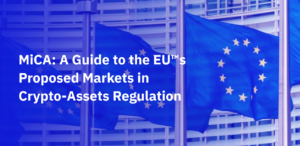 MiCA regulation is expected to have a significant impact on the EU crypto and blockchain market. It will provide legal certainty and a clear regulatory framework for issuers and service providers of crypto-assets operating within the EU, which is expected to boost investor confidence and attract new market participants.
MiCA regulation is expected to have a significant impact on the EU crypto and blockchain market. It will provide legal certainty and a clear regulatory framework for issuers and service providers of crypto-assets operating within the EU, which is expected to boost investor confidence and attract new market participants.
Moreover, it will enhance consumer protection by imposing strict requirements on service providers, such as capital and custody requirements, mandatory disclosure obligations, and rules on conflicts of interest.
On Thursday April 20th, the European Parliament will vote on the final text of the Markets in Crypto-Assets (MiCA) regulation, according to a tweet by Blockchain for Europe. The regulation will not make any changes for decentralized finance (DeFi), non-fungible tokens (NFTs), and stablecoins’ caps. It will not apply to “crypto-asset services provided in a fully decentralized manner without any intermediary.” However, the EU Commission will produce a report in 18 months assessing the “necessity and feasibility of regulating DeFi.”
As shown in the plenary agenda, the @Europarl_EN will hold a joint-debate on both #MiCA and #TFR (aka the @FATFWatch 'travel rule') on 19/4
They will then vote on both texts (separately) on 20/4
What a week we have ahead of us 😍 pic.twitter.com/b92EDMcRne
— Blockchain for Europe (@BlockchainforEU) April 15, 2023
However, some industry experts have raised concerns that the regulation could stifle innovation and limit the potential of DeFi and NFTs, which are currently exempt from the regulation. Moreover, some provisions of the regulation, such as the obligation for issuers of ARTs and EMTs pegged to a non-EU currency to stop issuing their stablecoins if they become widely used as means of exchange, could discourage market participants from using stablecoins in cross-border transactions.
In addition to MiCA, other regulations can be expected for this rapidly evolving industry. For instance, the EU Commission is currently working on a Digital Operational Resilience Act (DORA), which aims to enhance the operational resilience of digital services providers, including crypto-asset service providers, and ensure their compliance with cybersecurity and business continuity requirements. Moreover, the EU is expected to implement the Financial Action Task Force’s (FATF) Travel Rule, which requires virtual asset service providers to collect and share customer information in certain transactions.
Overall, while the MiCA regulation is expected to provide legal clarity and protection for market participants, it remains to be seen how it will impact innovation and the growth of the EU crypto and blockchain market. Other upcoming regulations are likely to further shape the industry and create new challenges and opportunities for market participants.



